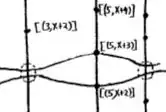I noticed modulo 8 the quadratic $x^2 + 7$ is zero for four separate values $x = 1,3,5,7 \in \mathbb{Z}_8$. The number of zeros exceeds the degree.
I would like to define the "variety" $\mathbb{Z}_8[x]/(x^2 + 7)$, but $\mathbb{Z}_8$ is not a field, so I have to use schemes. What is the geometric meaning of this quadratic vanishing at 4 points?
I know the points are the prime ideals in the ring I have constructed. In other worse, if $ab \in P$ then $a \in P$ or $b \in P$. Not sure how to compute those in this ring.
The topology on this scheme is given by the Zariski topology (I think) but I don't know what the open sets look like here.
Basic understanding of Spec$(\mathbb Z)$
Diophantine applications of Spec?
EDIT Mumford seem to have drawn groovy images of prime ideals in the scheme.
